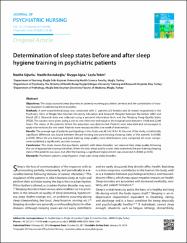Determination of sleep states before and after sleep hygiene training in psychiatric patients
Abstract
Objectives: The study assessed sleep disorders in patients receiving psychiatric services and the contribution of nurs ing education in addressing these disorders.
Methods: A semi-experimental study was conducted with 51 patients (23 females and 28 males) hospitalized in the
Psychiatry Clinic of Muğla Sıktı Kocman University Education and Research Hospital between November 2002 and
March 2013. Research data was collected using a personal information form and the Pittsburg Sleep Quality Index
(PSQI). The surveys were given using a one-to-one interview technique in the hospital room between 19:00 and 22:00
hours. The status of the patients before the education was determined. Patients were educated and encouraged to
apply interventions for one week. Patients were reassessed after one week of intervention.
Results: The average age of patients participating in the study was 46.24±14.54. At the end of the study, a statistically
significant difference was found between the pre-training and post-training sleeping states of the patients (t=0.000,
p<0.05). When the pre-training and post-training sleep quality score distributions were compared, all seven compo nents exhibited a significantly positive increase.
Conclusion: This study shows that psychiatric patients with sleep disorders can improve their sleep quality following
the use of appropriate nursing initiatives. When the total sleep quality scores were examined, the pre-training sleeping
state of the patients was poor, but after the training, a significant improvement was observed (t=0.000, p<0.05)


















